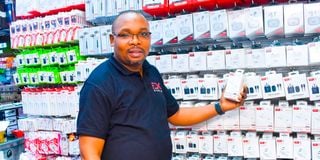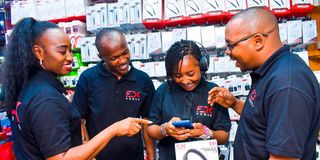Premium
'How I stumbled on the idea of customised mobile phone accessories'

Shampton Ndiritu, the founder of Fadecent Kenya and FDK, at one of his shops in Nairobi's CBD.
What you need to know:
- During the Covid-19 pandemic, Mr Ndiritu estimates that the mobile industry supported 70 per cent of the economy.
- The entrepreneur encourages anyone who has ventured into business and failed not to fear trying again.
Twelve years ago, Shamton Ndiritu, a Nairobi-based entrepreneur, was deep in debt, having taken loans from several financial institutions to support a failing camera business.
He was on the verge of giving up on his entrepreneurial ambitions when a conversation between friends about their challenge in sourcing certain mobile phone accessories led him to an idea that would turn his fortunes around.
“At the time, the Huawei Ideos phone brand had become very popular in Kenya because people could easily access it by redeeming their Bonga points and topping up with just a bit of cash,” Ndiritu recalls in an interview with Powering SMEs.
The phone had just come onto the market, so there were very few traders who could supply accessories such as screen covers designed for this specific type of phone.
Sensing an opportunity, Ndiritu applied for another loan of Sh1 million to enable him to source the accessories from China, sell them locally and use the profits to pay off the other loans.
“When I received the money and shared the news with my wife Mary, she became very worried, rightfully so, because we were not able to pay our other loans. How were we going to pay this one?” he said.
But with the money already in his account, his wife had no choice but to agree. Ndiritu converted the money into dollars, then boarded a plane to meet a contact in China who had been referred to him by a friend.
“I took the phone to the Chinese manufacturer and together we designed a cover... I came back with over 5,000 pieces to try and sell,” he said.
Within days of his arrival, the entrepreneur had sold all the covers he had brought back from China. He knew then that he was on to something and immediately called his contact in China to agree on the terms of a new partnership.
“I registered a company – Fadecent Kenya – that would sell customised mobile phone accessories under the brand FDK in the small camera shop I had along Dubois Road in Nairobi,” said Ndiritu.
After a week, the entrepreneur ordered another 10,000 pieces, which sold out just as quickly as the first batch. By then, they had made enough money to pay off the old loans and start repaying the current one.
But just as business was starting to pick up, other entrepreneurs got wind of the new opportunity and within a few months, the market was flooded with players selling almost identical products.
This affected profitability, as the number of orders he received began to dwindle, prompting him to change the business strategy.
“Initially, we would bring the products by air. It was expensive, but we did not mind because we had a market that was willing to buy at a very decent rate,” noted Ndiritu.
This mode of transport was also fast, as it would take five days for the products to arrive in Kenya. But as their revenues fell, they had to switch to sea transport, which was cheaper but slower.

From left: Fadecent Kenya and FDK staff Mary Wanjiru, Douglas Muiruri, Alexandria Wangechi and Shampton Ndiritu.
“It could take 30-35 days for a shipment to arrive. In a business where new devices are invented often, it can be dangerous not to have accessories in stock because tomorrow, people will want something else,” said Ndiritu.
This, coupled with complaints from customers that they were receiving substandard accessories from other players in the market prompted them to start producing the accessories locally.
“People were selling cheap but substandard goods, so a client would come to you and tell you about how they bought a charger a week ago and already it is not working,” said Ndiritu.
Inspired by other successful local manufacturers, the business moved its operations to a larger space along Accra Road in Nairobi.
“We knew we were going to fight with customers for some time because of the price, but our focus was to deliver a quality product that would ensure our customers came back,” said Ndiritu.
During the Covid-19 pandemic, when movement in the country was restricted, the entrepreneur estimates that the mobile industry supported 70 per cent of the economy.
The digital economy continues to support a large part of the population, particularly the youth, who are the most disadvantaged in terms of access to mainstream jobs.
For this reason, Ndiritu says that the government needs to incentivise local manufacturers and distributors so that they can be pass on the cost-benefit to the consumers.
“The cost of importing raw materials is too high. When His Excellency the late Mwai Kibaki was in office, we used to pay Sh18,000 to ship a cubic metre of goods. Currently, we are paying Sh60,000 per cubic metre,” he added.
In more advanced economies such as China, the entrepreneur notes that manufacturers get a lot of rebates from the government, which makes them very competitive, as it cushions their profit margins.
“The government needs to protect its people. We have foreigners producing goods for us, they do the supply and distribution, then they also do the wholesaling and retailing here,” said Ndiritu.
He says there is also a need to simplify the issue of taxation, as many traders do not pay taxes, not because they do not want to, but because they do not understand how to do so.
Implementing favourable policies could not only help to increase local revenue generation, but could also increase foreign exchange earnings as manufacturers start to export the surplus of what they produce.
“There was a time during the Kibaki era when people from the whole of East Africa would come here for goods. I don’t know what happened because we are not getting those customers anymore,” said Ndiritu.
The entrepreneur encourages anyone who has ventured into business and failed not to fear trying again, because the next business may be where their luck lies.





